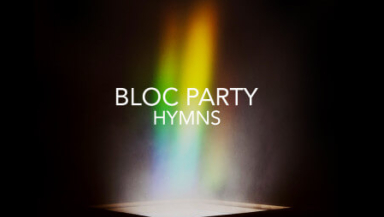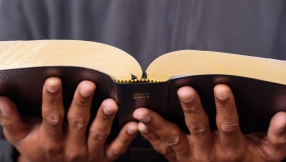
Bleary-eyed as I strolled into the underground station this morning I was handed a copy of the old Bible of pop music – the NME. Flicking through, I came across a classic atheist faux pas. The lead singer of one of the hottest bands of the moment, The 1975, was profiled.
Matthew Healy is a patron of the British Humanist Association, and the magazine quoted him promoting the tired old canard that belief in God is the equivalent of belief in fairies at the bottom of the garden. He'd borrowed the line from the great Douglas Adams, but no matter. (Matthew, believing in God is not like believing in fairies. It's really not. Read why here.)
This set me thinking. On the day Bloc Party release their fifth album, entitled Hymns, why can't pop musicians let go of the spiritual, even if they don't believe?
Hymns opens with the following lines... "Lord, give me grace and dancing feet, as I conquer all anxiety, the angel told me not to fear..."
Bloc Party aren't writing about any orthodox faith, let alone Christianity. But it seems they can't escape spiritual themes. Music of numerous different genres seems almost haunted by the spiritual.
We're not just talking here about artists who are believers themselves, such as Lecrae ("We don't wanna hear about movin' packs and foolish cats who lie and boast, we do wanna hear about Christ the king.")
Instead there seems to be a whole slew of artists who draw on the bottomless well of language and concepts surrounding faith for their music.
Arguably the biggest star in the world, Kanye West, wrote Jesus Walks ("God show me the way because the Devil trying to break me down – Jesus walks with me.") He even tweeted this week (probably with his tongue firmly in his cheek) that his new album would actually be a gospel record.
Of course it's not confined to hip hop. Pick any genre and you'll find allusions to God.

Arena-filling folkies Mumford and Sons' songwriter Marcus Mumford is famously the son of prominent leaders in the Vineyard movement in the UK. Their first album especially contains many references to faith. "Awake my soul, awake my soul, for you were made to meet your maker."
Other big indie rock bands keep the theme going. Elbow's recent albums contain references to "Hallelujah mornings" and Jesus being a Rochdale girl.
One of the biggest stars in rock music seems increasingly to be leaning on spiritual themes. Bruce Springsteen's 2012 album Wrecking Ball was packed with biblical allusions. It also contained a re-interpretation of Curtis Mayfield's classic Gospel-tinged People Get Ready. The Boss sings, "This train... Carries saints and sinners. This train... Carries lost souls, dreams will not be thwarted, faith will be rewarded..."
On album after album, the themes seem to go on and on. So what's happening here? Is there a revival happening in the world of pop music? Probably not. I think we can put it down to two things.
First, we can't escape the history of music. From the beginnings of the Western musical tradition through Gregorian chant, song has been inextricably linked with the Church. When pop music as we now know it began to emerge, its roots were in the Gospel songs of the Antebellum South and the Blues laments which also rose from the deep, rich heritage of that area.
When skiffle music met the blues and morphed into rock and roll and country rock, its biggest exponents often also sang Gospel. Elvis and Johnny Cash were among the biggest names in the charts, while also signing off on the old time religion.
This deeply entrenched history goes some way to explaining pop music's fascination with the spiritual. However, I think it goes further.
The second explanation is much more about the way in which music both affects us and allows us to express ourselves. Music lovers everywhere will understand the quasi-spiritual experience of listening to your favourite songs – be they sacred motets from many centuries ago, or the latest chart hit.

There is something about music which touches our souls in a way no other art form does. That explains why we use music in worship in the first place – it allows us to express something that words alone can't. That's why hymns and liturgies have been accompanied by music for thousands of years. The music adds an extra dimension to our corporate praise.
As well as this, the music has a didactic function. In other words, the music teaches us something. Good music speaks of the creative heart of the creator. The music expresses something about God but also helps us to learn about the things of God. As Psalm 98 says, "Make a joyful noise to the Lord, all the earth; break forth into joyous song and sing praises. Sing praises to the Lord with the lyre."
I think there's something about the spiritual power of music that more and more pop musicians are coming to understand. While they might not grasp the full reality of the creator, they're mining a vast range of emotions and resources when writing about matters of the spirit.
So while I'll be in church on Sunday singing the psalms and the songs, if you need me for the rest of the weekend, you'll find me somewhere with Bloc Party's Hymns playing. Loud.
















